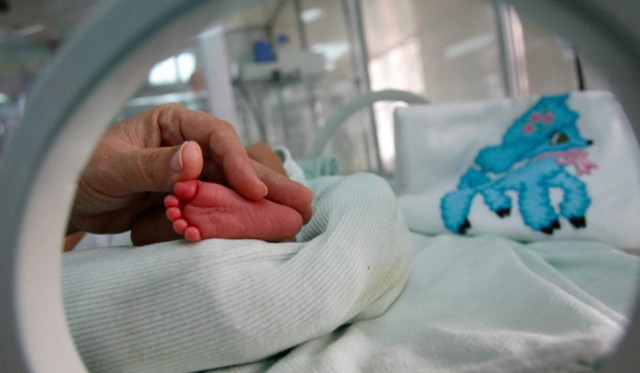Doctors raise concerns over sharp rise in infant mortality rate
Various diseases claimed lives of 6.2 million children in Pakistan in 2018

PHOTO: REUTERS
The seminar was jointly organised by the paediatrics department of the Sir Syed College of Medical Sciences, Save Our Children-CHK Trust, Express Media Group and GlaxoSmithKline Pakistan to raise awareness about precautionary measures that help save the lives of children, leading to a significant decline in the infant mortality rate.
Addressing the seminar, the speakers emphasised that every child had the right to lead a healthy life. They pointed out that various diseases claimed the lives of 6.2 million children in the country in 2018, which they said was indicative of a "looming danger".
According to Dr MN Lal, a paediatrician, in comparison to other countries, the rate of death right after birth has been observed to be significantly high in Pakistan. He shared that around 15,000 children are born every day and juxtaposed the figure against an infant death reported every three minutes in the country. Referring to the World Health Organisation and the United Nations Children's Fund's findings, he outlined delays in shifting expectant mothers to hospitals and negligence during pregnancy as major causes of infant death. Moreover, he identified pneumonia and diarrhoea as illnesses that claim most infants' lives in Pakistan.
Stressing the need to raise awareness among medical students, doctors and nurses regarding ways to protect newborns against factors that imperil their lives, Dr Lal said that children under the age of five constituted 15 per cent of Pakistan's population.
Another paediatrician, Dr Shabbir Ahmed Mallick, underlined the need to exercise precaution about health in the first three years of a child's life, adding that children are prone to malnutrition due to negligence in this period.
"Every one in three children are found to be afflicted by malnutrition in Pakistan," he said, identifying early marriages, big families, low incomes, avoiding or limiting breastfeeding and improper diet as the major causes of malnutrition. "The problem needs to be dealt with at grassroots level."
Additionally, he lamented that prenatal nutrition - nutrition before birth - remained a neglected subject in the country. "Only if a foetus is provided complete nutrition inside a mother's womb will it grow properly," he emphasised.
Paediatrician Dr Ghulam Murtaza recommended the inclusion of zinc supplements in diet, ensuring proper nutrition and timely vaccination as ways to keep children healthy. Apart from these solutions, consumption of clean drinking water, breastfeeding and washing hands too provide protection against diarrhoea, he said.
Dr Iqbal Memon, another paediatrician speaking on the occasion, also attributed Pakistan's slow progress to a large number of children suffering from malnutrition in the country. "As many as five million children are born every year in Pakistan, and around 1.4 million are underweight at the time of birth," he disclosed. He also regretted that most parents refused to get their children vaccinated against various diseases even when vaccination teams came to their doorsteps.
Stressing the consumption of boiled water as another measure to protect children against diseases, Dr Memon claimed that the mineral water available in the markets was "just filtered water."
Sir Syed College of Medical Sciences for Women Principal Brigadier Waseem Khan thanked the speakers and the guests for attending the ceremony and said that the country would only prosper if proper care was taken of children's health.



















COMMENTS
Comments are moderated and generally will be posted if they are on-topic and not abusive.
For more information, please see our Comments FAQ